Getting tested for neurodivergence often starts with a neurodivergency test or online self-assessment, but a formal diagnosis requires comprehensive evaluation performed by qualified healthcare professionals such as autism specialists and others. Whether you’re looking into ADHD traits, autism spectrum conditions, or other neurodevelopmental conditions, the process can involve multiple steps, and sometimes long waiting lists.
Understanding how to get tested for neurodivergence helps you access the right support, whether through NHS neurodivergence testing or a private neurodivergence assessment. While demand continues to grow, so does awareness, and early intervention can make a real difference in daily life and long-term outcomes.
This guide walks you through everything you need to know: from spotting neurodivergence symptoms and taking a neurodivergent test online, to understanding how to get diagnosed with neurodivergence and what to expect from the assessment process. We’ll also explore your options for support, treatment, and how to navigate the system step by step.
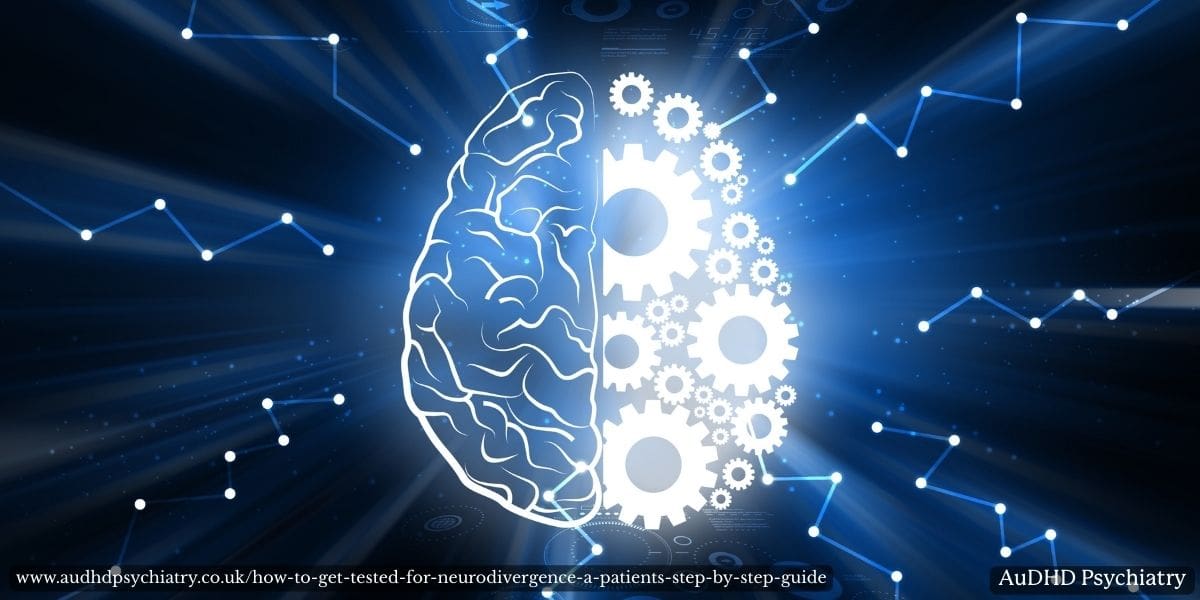
The Human Brain & Neurodiversity
Your brain development is as unique as your fingerprint. That means neurodivergence is a natural human variation, not a disability or disorder. Understanding ADHD, autism, and other neurodevelopmental conditions is crucial for recognising and supporting diverse cognitive profiles.
The human brain, with its network of neurons and complex processes, gives rise to a wide spectrum of cognitive functions and social interactions. Within this spectrum, we find a range of neurological differences that fall under the umbrella term of neurodiversity. This concept encompasses various neurodevelopmental conditions, including autism spectrum disorder (ASD) and attention-deficit hyperactivity disorder (ADHD), each presenting unique needs and characteristics.
Autism, for instance, is characterised by differences in social communication, sensory processing, and patterns of behaviour. Individuals within the autism spectrum may experience challenges in interpreting social cues or engaging in typical social interactions. On the other hand, those with ADHD might struggle with attention regulation, impulsivity, and hyperactivity.
Understanding these conditions as part of neurodiversity rather than viewing them solely as disorders has led to valuable insights in both research and support strategies. This perspective emphasises the importance of recognising and accommodating individual differences rather than attempting to fit everyone into a standardised mould.
Diagnostic tools for conditions like ADHD and autism have evolved to become more nuanced, taking into account the wide range of experiences and manifestations within each condition. These tools aim to identify specific challenges and strengths, allowing for more personalised support and interventions.
By embracing neurodiversity, we can nurture a more inclusive society that values the unique contributions of all individuals, regardless of their neurological makeup. This approach not only benefits those with specific diagnoses but also enriches our collective understanding of human cognition and social dynamics.
If you’re curious about your own profile, a full neurodivergence assessment can help uncover both challenges and strengths. Explore your unique neurological profile by booking a full neurodivergence assessment today.
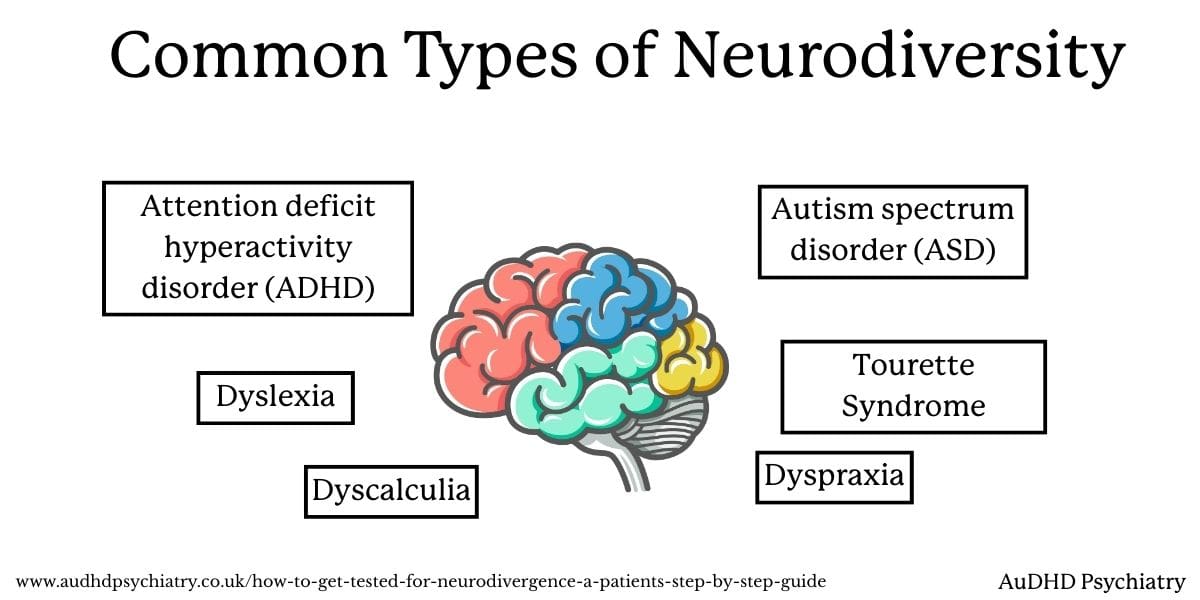
Understanding Neurodivergence Types
Brain differences that affect about 15% of the working population are part of neurodivergence. Understanding these differences can help individuals, families, and workplaces better support diverse cognitive needs.
Common neurodivergent conditions
Neurodivergent people’s brains process information differently, which leads to various conditions. Individuals with Autism Spectrum Disorder (ASD) have unique ways of communicating socially and develop focused interests.
ADHD shows up through differences in executive function skills and behaviour. Additionally, dyslexia affects how people read and write, while dyspraxia changes how they coordinate movements.
The list also includes dyscalculia, which makes understanding numbers difficult, and Tourette’s syndrome with its involuntary movements and sounds. Some people have Auditory Processing Disorder that changes how they handle sound information.
How neurodivergent traits appear
Neurodivergent traits often appear in overlapping ways. Research by Professor Amanda Kirby suggests many individuals exhibit characteristics from more than one condition. Traits may include:
- Better pattern spotting and problem-solving
- Sharper senses and perception
- Strong memory for details
- Out-of-the-box thinking and innovation
- Different ways of communicating
The numbers tell an interesting story: 1 in 44 eight-year-olds have autism spectrum disorder. About 9.4% of kids get ADHD diagnoses before turning 18. Dyslexia touches roughly 20% of people.
Myths vs facts about neurodivergence
Neurodivergence is often misunderstood. It is not a mental health condition, but a difference in brain wiring. While many people associate autism or ADHD with disability, these are neurological variations, not mental illnesses.
In the workplace, neurodivergent adults often excel in roles that require:
- Creative problem-solving
- Deep analysis
- Fresh thinking
- Strong focus
- Organised approaches
Studies show that understanding neurodiversity helps people develop better ways to succeed, rather than denying challenges. These employees bring special skills to their jobs, like spotting patterns quickly, solving problems creatively, and analysing details thoroughly.
In fact, many successful people are neurodivergent, like Temple Grandin, Sir Anthony Hopkins, and Greta Thunberg. They bring unique viewpoints and remarkable abilities to areas like memory and problem-solving.
If you’re looking to get assessed, we offer full evaluations for ADHD, and you can book an assessment with us today. Our diagnostic assessment process looks at your personal experiences and helps create strategies that work for you.
Additionally, you can learn more about how much an ADHD assessment costs in the UK, and the key differences between a Private ADHD Diagnosis apart from the NHS Assessment.
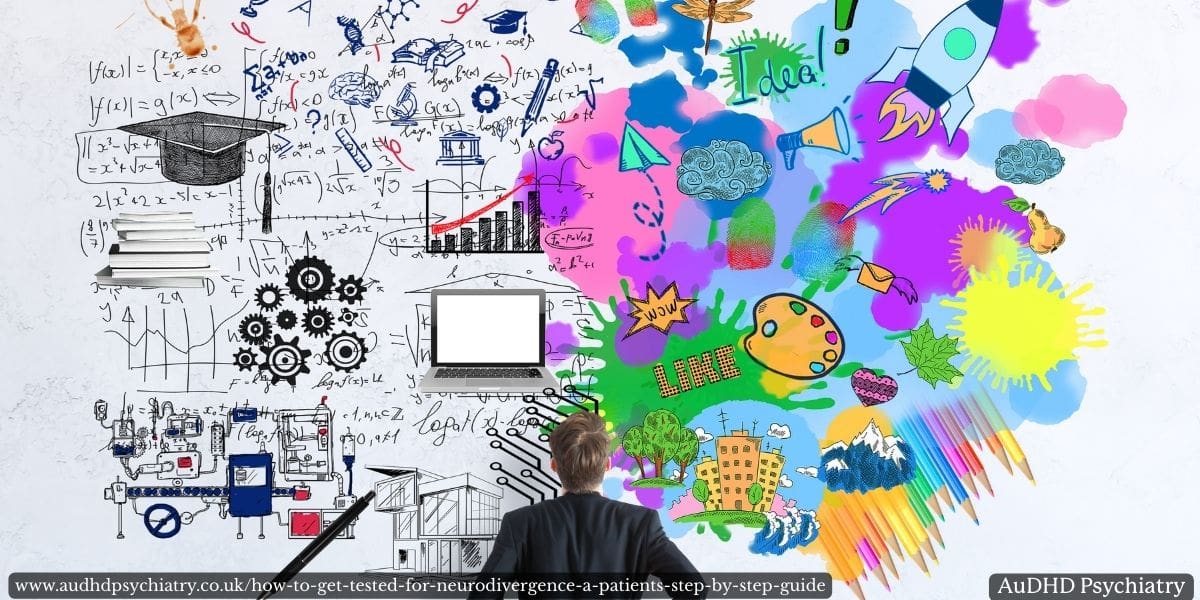
Signs You May Be Neurodivergent
Roughly 15–20% of the global population is thought to be neurodivergent. But how do you know if you might be one of them?
Neurodivergent traits can show up in everyday life in subtle but meaningful ways, from the way you interact socially to how you process information or manage your emotions. Understanding these signs is a useful first step if you’re considering a neurodiversity test or looking into how to get diagnosed with neurodivergence.
Social interaction patterns
Neurodivergent people have their own unique ways of social interaction. Many thrive in one-on-one talks but find groups more challenging. Some common social signs include:
- They prefer straightforward talk over hints
- They get deeply invested in specific topics
- They show empathy differently through shared experiences
- They connect better through tasks than casual chats
Thinking and learning styles
The neurodivergent brain processes information in its own special way. Some people learn best through visuals like diagrams and pictures, while others need hands-on experience to really get it. These diverse cognitive styles often include:
- Sharp skills in spotting patterns
- Amazing memory for details
- Creative ways to solve problems
- Step-by-step thinking approaches
Sensory experiences
The way senses work can affect daily life a lot. Some neurodivergent people might be extra sensitive to certain things, while others might not react as much. This shows up as:
- Being more sensitive to light, sound, or texture
- Reacting differently to touch or pressure
- Having unique responses to tastes and smells
- Sensing body position and movement differently
Executive function traits
The brain’s command centre works differently in neurodivergent people. This affects:
- How they handle time and stay organised
- Starting and finishing tasks
- Processing information and memory
- Managing emotions and impulses
Knowing these signs can help you decide if you should talk to a professional. To get a full picture of your experiences, take a look at our special assessments.
Your brain’s unique way of working is just a natural variation. Understanding these traits helps you know yourself better and find the right support. Our specialists are ready to help you explore your unique neurological profile – book an assessment today.
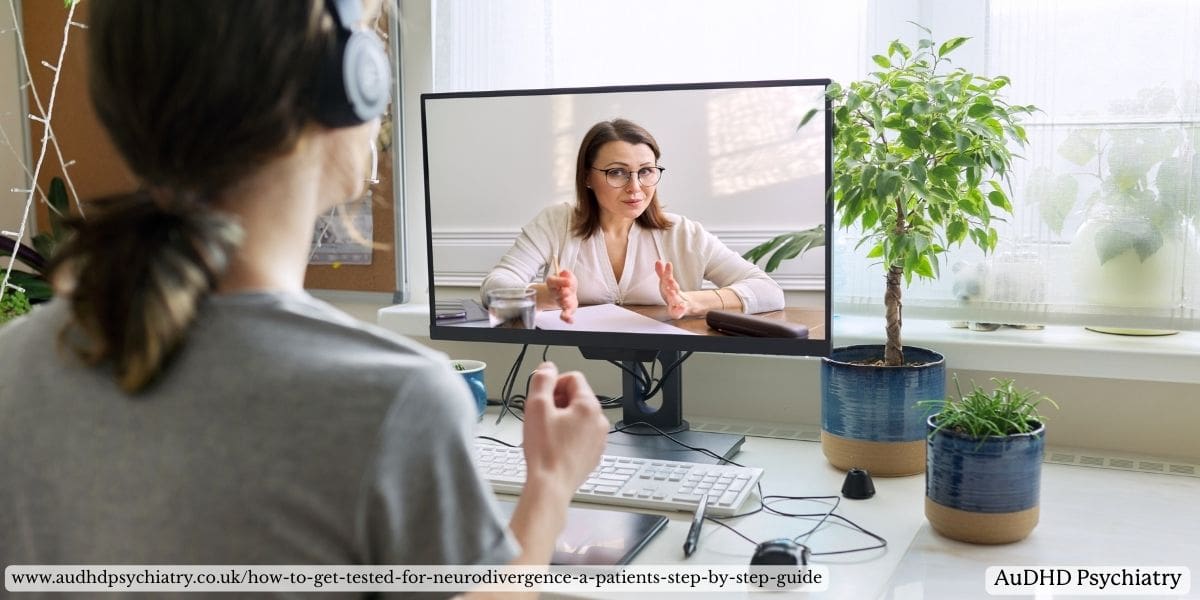
How to Get Diagnosed for Neurodivergence: Assessment Process
Once you’ve recognised possible neurodivergent traits, the next step is understanding how to get tested for neurodivergence. Getting a formal neurodivergence diagnosis involves more than just taking a neurodivergent quiz online. A full diagnosis requires a detailed evaluation from qualified healthcare professionals, not just an online screening.
The assessment process may vary depending on the condition being explored, but it typically involves several stages and may include input from multiple specialists. Both the neurodivergent test NHS and any private neurodivergence assessment follow structured steps to ensure an accurate diagnosis and appropriate support recommendations.
Initial consultation steps
The process starts with a referral from a qualified professional such as a GP, health visitor, or special educational needs coordinator (SENCO). Many services conduct a screening call to determine if a full review suits your needs before the formal assessment.
A vital part of this process involves pre-assessment questionnaires that gather information about:
- Your developmental history
- Current challenges and strengths
- Daily life experiences
- Family medical background
After this, specialists review this information along with other medical records or educational reports to create a complete profile.
Different types of evaluations
The assessment process changes based on the specific neurodivergent condition being reviewed. Specialists use several diagnostic tools for autism assessments:
- Autism Diagnostic Interview-Revised (ADI-R)
- Developmental, Dimensional and Diagnostic Interview (3di)
- Autism Diagnostic Observation Schedule (ADOS-2)
ADHD evaluations typically include:
- Standardised screening tools measuring attention and hyperactivity levels
- Structured clinical interviews to explore symptoms and history
- Computer-based testing for attention assessment
The assessment team observes social interaction patterns, communication styles, and behavioural traits across different settings. The team also looks at potential co-occurring conditions like learning differences or mental health considerations.
Some assessments need multiple appointments that span several hours. You’ll receive a detailed report after the evaluation that outlines:
- Assessment findings
- Diagnostic conclusions
- Specific support recommendations
- Strategies for daily life management
To better understand the potential costs involved, you can read our complete breakdown of ADHD assessment prices in the UK. You can also explore how private ADHD assessments differ from NHS options in terms of process, waiting times, and ongoing support.
Our specialist team provides complete evaluations for ADHD. Book your first consultation today to learn more about your unique neurological profile.
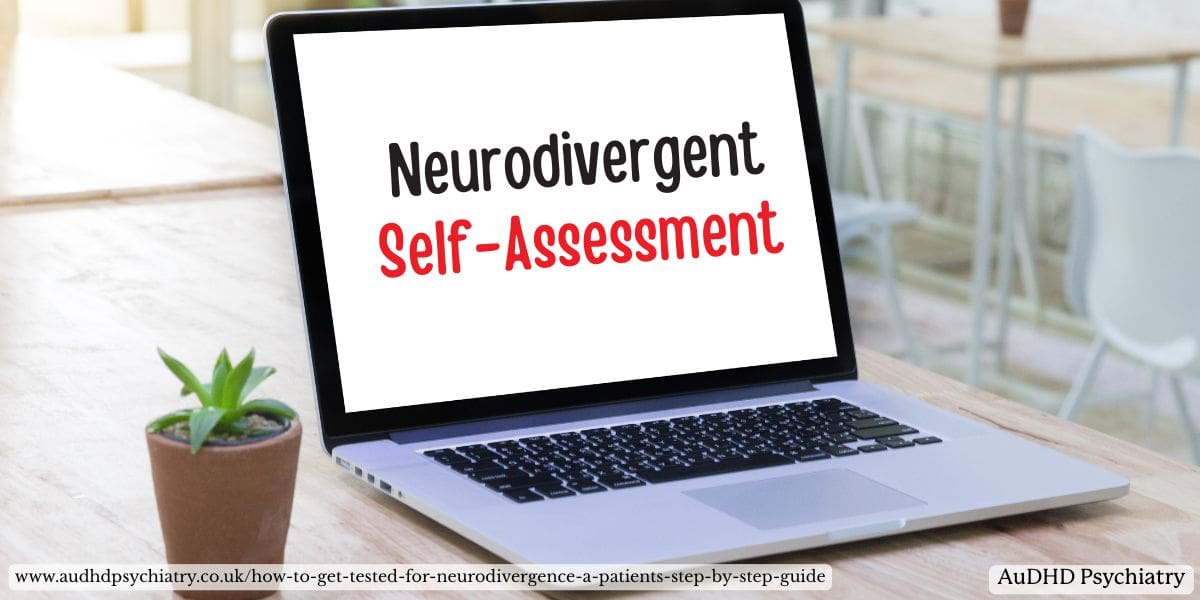
Take a Neurodivergent Self-Assessment Test Online
If, after reading so far, you’re asking yourself, “Am I neurodivergent?”, self-assessment quizzes can help you learn about possible neurodivergent traits. These online tests give you a starting point and let you explore privately at your own pace.
While it doesn’t replace a clinical diagnosis, a neurodiversity quiz can help you reflect whether your experiences may align with common ADHD symptoms and decide whether to pursue a full assessment. Click here to take our ADHD Self-assessment Quiz.
Take our ADHD Self-Assessment Quiz
If you’re exploring how to get tested for neurodivergence as an adult, the World Health Organization’s Adult Self-Report Scale (ASRS) Screener is a helpful first step in spotting signs of adult ADHD. You can finish this quick assessment in 3-10 minutes. The test works best for adults 18 and older who have not yet received a formal diagnosis.
The ASRS looks at core symptoms through questions about:
- Daily experiences and situations
- Attention patterns
- Task management abilities
- Behavioral tendencies
Important: ADHD affects 4.4% of U.S. adults, but many people don’t know why they face challenges. This screening tool gives helpful information, but you’ll still need a full professional evaluation.
Take our ASD Self-Assessment Quiz
The Autism Spectrum Quotient (AQ) test uses 50 questions to measure autistic traits in adults. This complete assessment looks at:
- Social interaction patterns
- Communication priorities
- Imagination and creativity
- Attention to detail
- Adaptability to change
The AQ test helps spot behaviours that doctors once called Asperger syndrome, now known as level 1 ASD. This self-guided questionnaire marks your first step toward understanding possible autism spectrum traits.
Understanding Test Results
Self-assessments give you a good starting point, but remember these key points:
- These tests work as screening tools, not diagnostic instruments
- Results show possible traits but can’t confirm or rule out a diagnosis
- Other health conditions might look like ADHD or autism symptoms
- You need a professional evaluation for an accurate diagnosis
Your test results can help start a conversation with healthcare providers. These screenings often lead to better discussions with medical professionals and help you decide about further evaluations.
For a breakdown of what you might expect, explore our Complete Guide to ADHD Diagnosis Costs in the UK. You can also learn about the differences between private and NHS ADHD assessments to help you make the right decision for your needs.
Ready to take the next step? Book a comprehensive assessment with our specialist team. We provide thorough evaluations for both ADHD and autism spectrum conditions and recommend the right support options for you.

The Benefits of Getting a Neurodiversity Assessment
A professional assessment helps you get evidence-based treatments that match your specific needs. Getting a formal diagnosis lets you understand your unique cognitive style and access the right support systems.
Treatments for ADHD
ADHD treatment strategies include multiple approaches. We focus on medication and behavioural interventions. Stimulant medications and non-stimulant options manage symptoms effectively in 70-80% of children. These medications help:
- Improve concentration
- Reduce impulsive behaviours
- Improve daily functioning
- Support better task management
Behavioural therapy shows great results beyond medication. This approach includes:
- Parent training in behaviour management
- Classroom-based interventions
- Social skills development
- Organisational skills training
Cognitive Behavioural Therapy (CBT) helps people connect their thoughts, feelings, and behaviours. This well-laid-out approach develops coping strategies and improves self-regulation.
Treatments for Autism
Autism treatment aims to reduce symptoms affecting daily life while improving quality of life. Current approaches include:
Behavioral Interventions
Applied Behaviour Analysis (ABA) remains the most evidence-based treatment. This method:
- Encourages desired behaviours
- Uses step-by-step instruction
- Tracks measurable progress
- Adapts to individual needs
- Developmental Approaches
Speech and language therapy improves communication abilities. Occupational therapy strengthens independence through:
- Daily living skills development
- Sensory integration techniques
- Fine motor skill improvement
- Educational Interventions
The TEACCH approach provides structured learning environments. This method:
- Uses visual learning strategies
- Establishes clear routines
- Adjusts classroom structure
- Improves academic outcomes
- Social-Relational Treatments
These interventions build emotional bonds and social skills. Programs like:
- Floor Time
- Relationship Development Intervention
- Social Stories
- Group skill-building sessions
Getting a formal diagnosis opens doors to workplace accommodations. Organisations now recognise the value of neuro-inclusive practices and offer tailored support for different thinking styles.
If you’re considering assessment but unsure where to begin, our Guide to ADHD Diagnosis Costs in the UK explains what to expect financially. You can also also explore our guide comparing a Private ADHD Diagnosis vs NHS Assessment to help decide which route works best for you.
Would you like to explore treatment options? Book your detailed assessment today. Our specialist team provides full evaluations for both ADHD and autism spectrum conditions to help you get appropriate support and interventions.

What Happens After a Neurodivergent Diagnosis?
A neurodivergent diagnosis starts your experience of understanding and embracing your unique cognitive style. Moving forward means getting support services, workplace accommodations, and connecting with others who share your experiences.
Support services available
Several organisations help neurodivergent people. The National Autistic Society helps 700,000 autistic people in the UK through volunteer-led branches and online peer support. Their online directory links people to targeted services and dedicated caseworkers who help with specific challenges.
ADHD UK helps diagnosed people and their support networks – including family members, friends, and employers. The ADHD Foundation leads UK’s neurodiversity charity space, serving about 20% of the population who live with various neurodivergent conditions.
NICE guidelines state you should receive after diagnosis:
- A named worker from the core team for customised support planning
- Access to social care needs assessment
- Information about financial support and benefits
- Guidance on local community resources
- Parent and carer learning opportunities
Workplace accommodations
The law requires employers to provide reasonable adjustments for neurodivergent employees. Budget-friendly workplace accommodations include:
Environmental Modifications
- Quiet spaces for focused work
- Sensory-friendly lighting
- Designated break areas
- Noise-cancelling headphones when needed
Communication Support
- Written instructions for important tasks
- Clear documentation of expectations
- Regular one-on-one meetings
- Structured feedback sessions
The Access to Work scheme funds work support needed, including neurodiversity coaching. The Disability Confident Scheme also connects neurodivergent job seekers with inclusive employers.
Building a support network
Strong connections lead to long-term success. Support networks cover:
Professional Support
- Occupational therapists
- Speech and language therapists
- Mental health professionals
- Career counselors
Community Resources
Organisations like Neurodiversity Works support accessible opportunities and campaign against workplace discrimination. AADD-UK runs support groups and maintains an active online community. They ensure adults with ADHD get equal access to services whatever their background.
Educational Resources
The ADHD Foundation provides strength-based services through specialised programs. Genius Within, a social enterprise, offers coaching and assessments designed for neurodivergent individuals.
Want to begin your neurodivergent assessment experience? Our specialist team provides complete evaluations for both ADHD and autism spectrum conditions.
Book your assessment today to get customised support and accommodations that match your unique cognitive style. Our experienced professionals know that each neurodivergent individual needs specific adjustments and support mechanisms to thrive in their personal and professional lives.
[Internal Link: Complete Guide to ADHD Diagnosis Costs in UK] [Internal Link: NHS vs Private ADHD Diagnosis Guide]
References
[1] – https://theneurodivergentcoach.co.uk/neurodivergent-traits-how-to-retain-and-empower-them/
[2] – https://edu.admin.ox.ac.uk/neurodivergent-conditions
[3] – https://www.verywellmind.com/what-is-neurodivergence-and-what-does-it-mean-to-be-neurodivergent-5196627
[4] – https://www.helenbartimote.co.uk/blog/navigating-life-after-a-neurodiversity-diagnosis-strategies-for-acceptance-and-empowerment
[5] – https://www.neurodiversityhub.org/onboarding/work-accommodations-profile
[6] – https://my.clevelandclinic.org/health/symptoms/23154-neurodivergent
[7] – https://bwc.nhs.uk/adhd-autism-and-neurodivergence-support/
[8] – https://www.psicon.co.uk/news/am-i-neurodivergent-signs-and-symptoms
[9] – https://www.verywellmind.com/the-neurodivergent-guide-to-social-skills-7500818
[10] – https://www.think-differently.com.au/rethinking-connection-neurodiversity-and-social-communication/
[11] – https://autism.org/learning-styles-autism/
[12] – https://elearningindustry.com/types-of-neurodiversity-and-how-to-design-learning-experiences-for-them
[13] – https://www.sciencedirect.com/science/article/pii/S0010945224000078
[14] – https://www.autismspeaks.org/sensory-issues
[15] – https://www.autism.org.uk/advice-and-guidance/topics/sensory-differences/sensory-differences/all-audiences
[16] – https://www.neurosparkhealth.com/blog/sensory-profiles-in-neurodivergent-populations

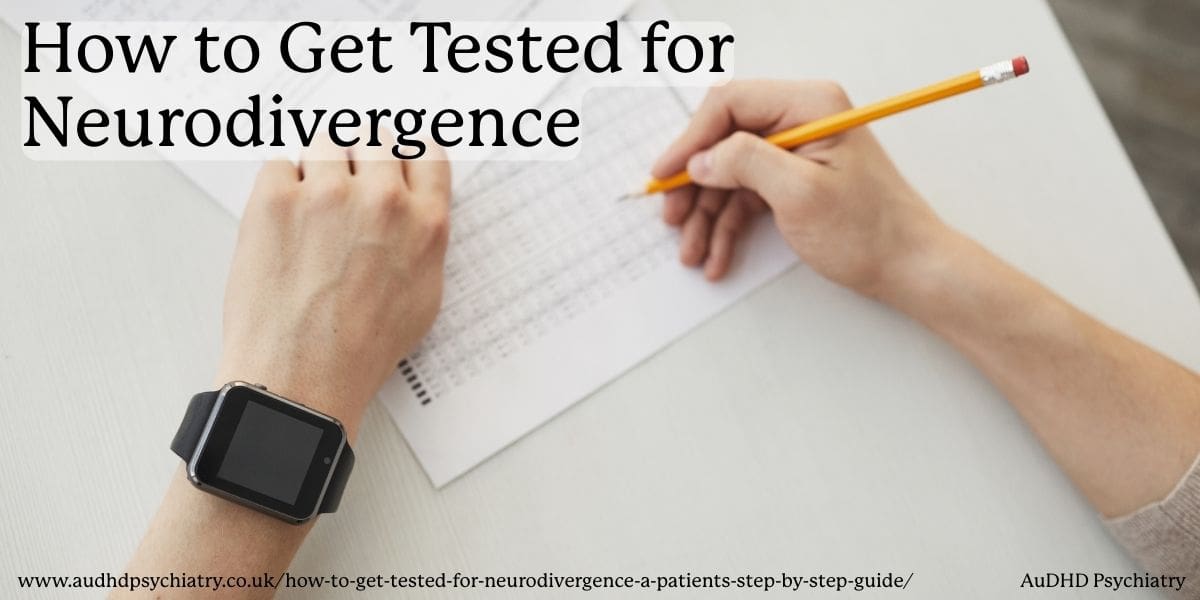


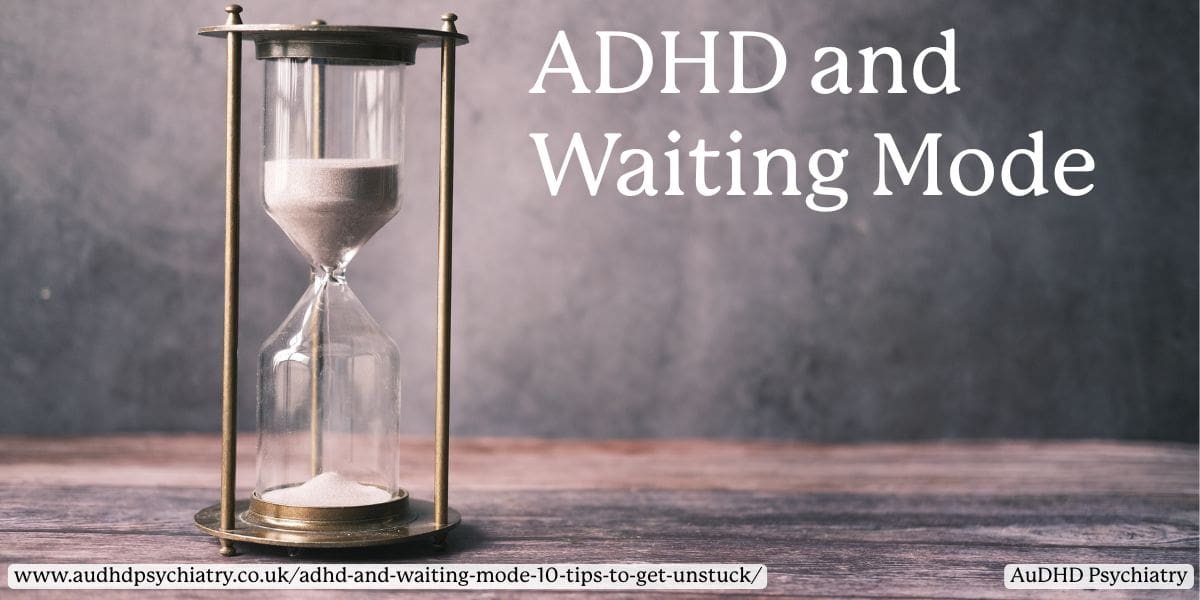


hhdpul
9k4wyx
nt9qlw
unubie
sl6lmm
9exkkf
7kwu2d
j253l0
msxdij
amu2o7